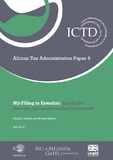| dc.contributor.author | Santoro, Fabrizio | |
| dc.contributor.author | Mdluli, Winnie | |
| dc.coverage.spatial | Eswatini | en |
| dc.date.accessioned | 2019-05-07T14:11:15Z | |
| dc.date.available | 2019-05-07T14:11:15Z | |
| dc.date.issued | 2019-05-03 | |
| dc.identifier.citation | Santoro, S. and Mdluli, W. (2019) Nil-Filing in Eswatini: Should the Revenue Administration be Concerned? ATAP Working Paper 6, Brighton, IDS | en |
| dc.identifier.isbn | 978-1-78118-553-7 | |
| dc.identifier.uri | https://opendocs.ids.ac.uk/opendocs/handle/20.500.12413/14478 | |
| dc.description.abstract | The tax-to-GDP ratio in developing countries is still remarkably low for many different reasons. One of the key factors behind poor tax collection is low tax compliance. In this paper we look at compliance with income tax in Eswatini, focusing on one particular dimension – filing of nil returns. Nil-filing represents a sizeable share of returns in many African countries. However, it is largely unexplored in the literature and disregarded by tax agencies, who are more interested in declarations yielding a positive return. For these reasons, we attempt to fill the gap by mapping nil-filing in Eswatini using anonymised administrative data provided by the Swaziland Revenue Authority (SRA).
First, we show that over a period of five years about 30 per cent of corporate income tax (CIT) returns are nil every year. This translates into 45 per cent of taxpayers nil-filing in at least one year over the five-year period. Moreover, nil-filing varies a lot within categories of firms: it is much more likely to take place in certain districts and sectors in Eswatini, and is more common for small and younger firms. At the same time, persistent nil-filing is also very common. We also cross-check CIT data with value added tax (VAT) and Pay As You Earn (PAYE) data to monitor the filing behaviour of nil-filers across different tax returns, finding some extent of misreporting – probably due to evasion. After describing the results, we analyse additional qualitative data and provide recommendations for future research. | en |
| dc.language.iso | en | en |
| dc.publisher | IDS | en |
| dc.relation.ispartofseries | ATAP Working Paper;6 | |
| dc.rights.uri | http://creativecommons.org/licenses/by-nc/4.0/ | en |
| dc.subject | Finance | en |
| dc.subject | Governance | en |
| dc.title | Nil-Filing in Eswatini: Should the Revenue Administration be Concerned? | en |
| dc.type | Series paper (non-IDS) | en |
| dc.rights.holder | Institute of Development Studies 2019 | en |
| dc.identifier.team | Governance | en |
| rioxxterms.version | VoR | en |


